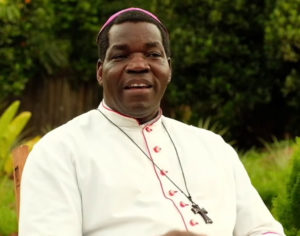Sr. Jecinter Antoinette Okoth, FSSA
Catholic bishops have encouraged journalists and all Christians to be cautious and authentic when using social media to disseminate information knowing that “we are all responsible for the communications we make.”
Addressing Christians in his homily on Saturday, May 15, during the Holy Eucharist celebration to mark the 55th World Day of Communications, Bishop Maurice Muhatia Makumba of Kenya’s Nakuru Diocese said that “the media world today is in real danger of copy and paste where people use social media to forward unverified messages.”
“There is an inherent real risk in social media if we are not men and women of encounter. The challenge is that we become spreaders of rumour,” the Prelate cautioned.
He added that this message is not only for journalists for “We are all users of the media and we all need to be authentic and true witnesses and avoid forwarding unjustified messages.”
On the 2021 theme for World Day of Communications declared by Pope Francis early this year, “Come and See,” communicating and encountering people where they are and as they are,” Bishop Muhatia said that the Holy Father is inviting all Catholic journalists to ‘encounter’ with the people in order to be fruitful communicators.”
He highlighted that “personal encounter with people and with reality makes us authentic witnesses in communicating with others.”
Making reference to the current Covid-19 pandemic during the event that was also streamed live on Facebook, the Bishop noted that lately “we hear the messages such as ‘wear mask, keep social distance, stay at home’ – information which keeps us at a distance from encountering others yet human person by their very nature are social beings drawn together by communion.”
“As a Church, we must device new ways of promoting “encounter” in a world that is faced with the pandemic (and) ask the Lord to give us ways and means of promoting encounter between human beings,” Bishop Muhatia advised.
The Kenyan Prelate urged journalists and all Christians to take seriously Pope Francis’ message knowing that “it is only in encounter that we meet the truth and unless we encounter people we will be promoters of fake news.”

South Sudan
Also emphasizing the need for proper use of the social media platforms in propagating information, Bishop Barani Eduardo Hiiboro Kussala of the Catholic Diocese of Tombura-Yambio, South Sudan, in his message on World Day of Communications said, “The media speaks to us in the same way we speak to each other; where we select the appropriate words to communicate to our neighbors, to our friends, and to our audience (and) this is exactly what journalists need to employ in the media.”
“Select the appropriate words that do not hurt, incite or aggregate a volatile situation but rather words that heal, bring hope and promote unity,” Bishop Hiiboro said in his statement published on Monday, May 17.
“This is also true with regard to information shared on Social Media which have become very popular. The WhatsApp, Facebook, Twitter, and other social media fora should be appropriate to all,” he underscored adding that it is paramount to take precautions and be aware that we are writing to fellow human beings who have feelings.
In reference to Pope Francis’ message on encountering people so as to be authentic in communication he said, “In order to tell the truth of life, it is necessary to move beyond the complacent attitude that we “already know” certain things. Instead, we need to go and see them for ourselves, to spend time with people, to listen to their stories, and to confront reality, which always in some way surprises us.”
Bishop Hiiboro appreciated the work of all communicators, media agents and journalists for their noble work, calling them “the voices of the voiceless; the voices of all the people; the agents of change; and the agents of awareness.”
“In your noble duties as journalists everywhere in the world, you bring from your own societies, from your own communities and the world information that is useful and crucial, information that exposes the struggles and success of a given community; information that would otherwise not have reached the public domain,” the Bishop said.
He further appealed to journalists in South Sudan to continue learning the media ethics and pay more attention to how your journalistic work can promote peace, unity, harmony, and development.
“I think more than anything else, the people of South Sudan are yearning for peace because peace means development, peace means growth,” Bishop Hiiboro said in his statement addressing the journalists in South Sudan and urging them to highlight stories that promote peace.
